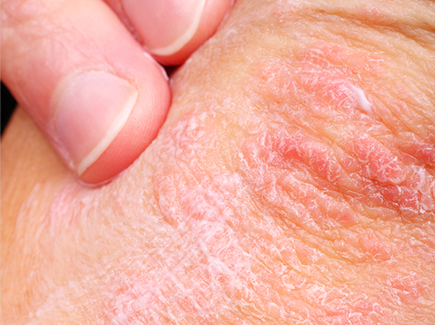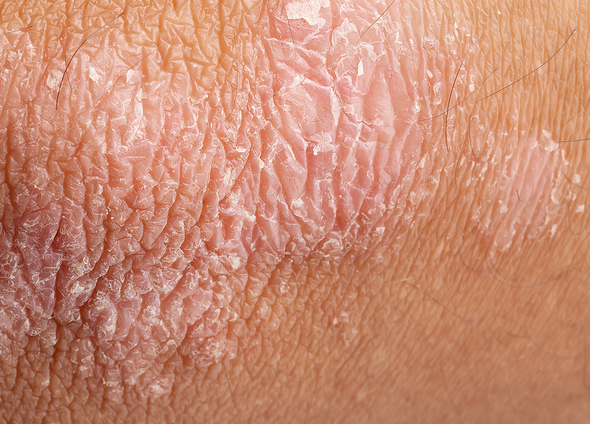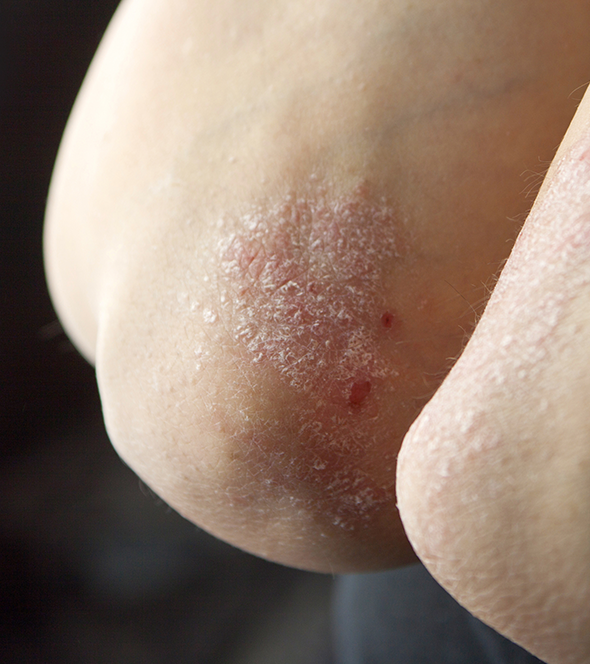Psoriasis Treatment at Advanced Dermatology, P.C.
Skin conditions can be frustrating, especially when symptoms like redness, flaking, or itching persist without clear relief.
One of the most common chronic skin concerns we treat at Advanced Dermatology, P.C. is psoriasis, which can vary widely in severity and appearance from person to person.
Our board-certified psoriasis dermatologists are here to help you manage symptoms with a personalized plan that targets your specific type and level of psoriasis.
Whether you’re experiencing occasional flare-ups or more persistent patches, we’ll work with you to find long-term solutions that improve your skin health and overall comfort.


What Is Psoriasis?
Psoriasis is an autoimmune skin condition that causes the body to produce new skin cells too quickly.
This buildup leads to thick, scaly patches that may itch, sting, or crack. While psoriasis is not contagious, it can interfere with your day-to-day life, both physically and emotionally.
What Causes Psoriasis?
Psoriasis results from an overactive immune response that accelerates the skin cell life cycle. Instead of gradually shedding dead skin cells, the body builds them up on the surface within days.
Common triggers include:
- Stress
- Illness or infection
- Cold or dry weather
- Alcohol use
- Hormonal shifts
- Medications like lithium or beta-blockers
Types of Psoriasis
There are several forms of psoriasis, each with unique symptoms.
Our experienced psoriasis specialists can diagnose your type and recommend the most appropriate course of treatment.
Types include:
- Plaque Psoriasis: The most common type, marked by raised red patches with silvery-white scales.
- Scalp Psoriasis: Often appears as flaking, itching, and redness on the scalp.
- Pustular Psoriasis: White pustules (non-infectious) surrounded by red skin, usually on the hands or feet.
- Guttate Psoriasis: Small, drop-like spots that can appear after a strep infection.
- Inverse Psoriasis: Smooth, red patches in areas where skin rubs together, such as underarms or groin.
- Erythrodermic Psoriasis: A severe, rare type that causes widespread redness, scaling, and discomfort.
- Nail Psoriasis: Causes nail pitting, thickening, or separation from the nail bed.
- Psoriatic Arthritis: Joint stiffness, swelling, and pain that may accompany skin symptoms.
- Sebopsoriasis: Greasy, flaky patches on the scalp, face, and chest.


Psoriasis Symptoms
Common symptoms include:
- Red or pink plaques with silvery-white scales
- Itchy, burning, or sore skin
- Cracking or bleeding patches
- Discolored or thickened nails
- Swollen, stiff joints (in psoriatic arthritis)
Commonly Affected Areas
Psoriasis can occur anywhere but most often appears on:
- Scalp
- Elbows
- Knees
- Lower back
- Face
- Palms and soles
- Skin folds (underarms, groin)
- Fingernails and toenails
How Is Psoriasis Diagnosed?
A consultation with a psoriasis dermatologist includes a complete skin examination and a medical history review. Sometimes, a biopsy may be performed to confirm the diagnosis and rule out other conditions.
Psoriasis Treatment Options
There is no one-size-fits-all approach to psoriasis care. Your treatment plan will depend on the severity of your condition, the type of psoriasis, and how your skin responds to previous therapies.
For Mild Psoriasis (Less Than 10% Body Coverage)
- Topical corticosteroids.
- Vitamin D analog creams.
- Moisturizers to reduce flaking.
- Specialized scalp psoriasis treatments (shampoos, steroid foams, salicylic acid-based products).
For Moderate to Severe Psoriasis (More Than 20% Coverage)
- Phototherapy (light treatment).
- Systemic medications (oral or injectable).
- Biologic therapies that target immune response.
- Combination therapy for increased effectiveness.
- Laser treatments (such as pulsed dye laser) for stubborn areas.
- Steroid injections for small, resistant plaques.

Where to Find a Psoriasis Specialist
We provide expert psoriasis treatment at over 40 convenient locations across New York, New Jersey, and Connecticut.
No matter where you are, a trusted psoriasis specialist is nearby.
Frequently Asked Questions About Psoriasis
Are you curious about psoriasis? Explore some of our most asked questions and answers below.
How Can I Prevent Psoriasis?
There’s no guaranteed method to prevent psoriasis completely. Still, you can lower your risk by sticking to your healthcare provider’s treatments, maintaining a healthy lifestyle, practicing good skincare, and avoiding triggers that might cause symptom flare-ups.
How Is Psoriasis Diagnosed?
It can be hard to diagnose psoriasis because it is like other skin conditions. A detailed examination, sometimes with a microscope, may be necessary by a dermatologist.
Is There a Cure for Psoriasis?
There’s no cure for psoriasis. It is a long-term condition where symptoms may appear and disappear over time. However, treatments are available to ease symptoms and help you look and feel better.
What Can I Do to Improve My Psoriasis?
Psoriasis is a severe skin condition that needs to be treated by a trained professional. However, there are some things you can do yourself to ease the discomfort, including:
- Keeping your skin hydrated with an ointment or cream that your dermatologist approves.
- Avoiding contact with water as much as possible, as water dehydrates your skin.
- Using mild, non-fragrant soaps.
- Applying medicated shampoo is an effective psoriasis treatment on the scalp.
- Wearing cotton clothes instead of synthetic clothing to avoid unnecessary sweating.
- Avoiding scratching.
- Commit to your treatment even if it takes some time to see results.
- Sunlight and seawater benefit your skin, but it is important to prevent sunburn.
What Are the Most Common Psoriasis Treatments?
The correct psoriasis treatment can improve your condition and make you feel much more comfortable in your skin. Treatment aims to regulate the overactive immune system, allowing the skin to heal. The most common psoriasis treatments are light therapy, laser therapy, topical treatments (like creams and oils), injections (such as biologics), and oral medication. Our expert dermatologists will define the right treatment combination for you.
How Quickly Will I Start Feeling Better After Treatment?
When psoriasis symptoms flare up, they can stick around for several weeks to a few months. Your healthcare provider might prescribe medications to help your skin heal faster. When your symptoms disappear, it’s called remission. This means your psoriasis isn’t active, but it could return later. Remission can last for a few months to a couple of years. If you avoid things that trigger your symptoms, it can help keep your psoriasis quiet for longer.
What Are the Potential Complications of Psoriasis?
Psoriasis can bring more than just itchy and scaly skin. It might cause swollen joints or arthritis. People with psoriasis might also have a higher chance of diabetes, obesity, high cholesterol, strokes, and heart attacks.
When Should I See My Dermatologist for Psoriasis?
Keep an eye on your skin by doing regular self-exams. If you notice any persistent or worsening rashes, it’s important to contact your healthcare provider immediately.
Where Can I Get Treatment?
Our dermatologists are trained professionals with specialized knowledge about psoriasis and other skin conditions. Advanced Dermatology, PC has 40+ locations in the Northeast. Please look at our location overview to find a dermatologist near you.
Effective Psoriasis Treatment Near You
Don’t let itchy, scaly, red skin affect your everyday life. Visit Advanced Dermatology, PC, for psoriasis treatment when and where you need it most.
